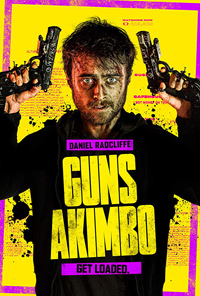We Lost God Control: Howden Gets Loud with Gamer Action Comedy
 Video games killed the cinema star could be one of many punchy quips concerning Guns Akimbo, the sophomore flick from Jason Lei Howden, a UK/German/New Zealand co-production starring Daniel Radcliffe playing another of those cerebral, ineffectual sorts who must be transformed by violence to reach an appropriate level of masculinity to attract women and the respect of his male peers. Except, Howden highlights the heightened platform of social media via a reality competition in which criminals battle one another to death while fans and lookie-loos hang onto every second of unrehearsed footage courtesy of the drones flying throughout the city courtesy of the game’s creators.
Video games killed the cinema star could be one of many punchy quips concerning Guns Akimbo, the sophomore flick from Jason Lei Howden, a UK/German/New Zealand co-production starring Daniel Radcliffe playing another of those cerebral, ineffectual sorts who must be transformed by violence to reach an appropriate level of masculinity to attract women and the respect of his male peers. Except, Howden highlights the heightened platform of social media via a reality competition in which criminals battle one another to death while fans and lookie-loos hang onto every second of unrehearsed footage courtesy of the drones flying throughout the city courtesy of the game’s creators.
Vibrantly photographed but ultimately as brainless as watching a video game you’ve no hand in altering the duration of, Howden’s title will likely have its fans with a title designed conveniently for multi-tasking or distraction.
While Howden does attempt to critique the hate culture which is an expected facet of the target audience for his film, Guns Akimbo isn’t nifty or smart enough to sustain interest to the third act, particularly with a dull character arc for Radcliffe (see a similar characterization from Elijah Wood in Come to Daddy, also distributed by Saban Films only weeks earlier).
While clearly this isn’t a film to be taken seriously for one single second, the injuries sustained by Miles when guns are nailed into his hands are a constant distraction (not unlike the poorly conceived man/machine hybrids of Neill Blomkamp’s 2013 film Elysium). As a saving grace, Samara Weaving is quite entertaining as the nearly omnipotent assassin Nix, her dialogue delivery channeling the energy of Howden’s script several other performers simply cannot. As menacing as Ned Dennehy is as Richter (looking like a Die Antwoord sycophant), he seems to be from a universe not related to the film. While its neon-lit cityscapes and constant scuffling are reminiscent of the John Wick series, Howden’s offering is more in spirit of Ilya Naishuller’s Hardcore Henry (2015).
★★/☆☆☆☆☆


